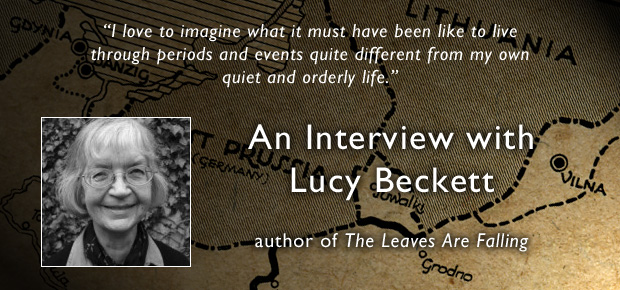
Lucy Beckett is an award-winning novelist living in Yorkshire, England, where she teaches at Ampleforth Abbey. Her novels include The Time Before You Die, A Postcard from the Volcano, and the recently released The Leaves Are Falling. She is also the author of In the Light of Christ: Writings in the Western Tradition. Ignatius Press Novels interviewed Mrs. Beckett via email.
The Leaves Are Falling is your third work of historical fiction published by Ignatius Press. Why are you interested in the historical fiction genre?
Beckett: I am a historian by training, but I got married very young (age 19), had a lot of children and now grandchildren, live in the depths of the country, and have been a schoolteacher for 40 years (I still teach Latin in the local high school), so I never had a chance to do proper historical research, though I have written academic books on literature and music. So historical fiction is perfect for me: I can read plenty of books at home, and I love to imagine what it must have been like to live through periods and events quite different from my own quiet and orderly life. Because I am a teacher, I also like the idea of helping people to understand better things that they may know little about: the Reformation in England (The Time Before You Die), the descent of Germany into the horrors of Nazism (A Postcard from the Volcano) and now, in The Leaves Are Falling, what really happened on the Eastern front in World War II, where no British or American forces ever were.
This novel provides a lot of details about the historical events of World War II and the events after the war. How much research did you do before writing this novel? Do you have any favorite history books or resources that helped your research?
Beckett: I did a lot of work and read a great many history books. The two authors who were the most help with this new book were Professor Timothy Snyder, now at Yale, particularly his books The Reconstruction of Nations, and Bloodlands: Europe between Hitler and Stalin, and Yitzhak Arad: The Holocaust in the Soviet Union. I read dozens of other books, including all (not very much) that has been written about the Jewish partisans in Byelorussia, and about the Katyn massacre. (Everything that happens in the Soviet prison in the last third of my book is true, and Major Zarubin, the NKVD interrogator, and Rabbi Steinberg, are real historical figures.)
The novel tells the story of Joseph Halpern, an octogenarian book seller who finds a description of his father in a story, and wonders if his own story would be worth telling. Why did you decide to tell Joseph’s story in this novel?
Beckett: I was haunted by the unfinished stories I left at the end of A Postcard from the Volcano, and Joe Halpern (a completely invented character) presented himself – as characters do present themselves to novelists.
Joseph Halpern experiences many tragedies in his early life, during the war when he lost his family and home. What can this story teach us about forgiveness?
Beckett: There is no one about, in England in Joe’s adult life, for him to forgive, but he learns to forgive, by learning to understand, the destiny that dealt him such terrible blows – and, without at the time realising it, he learns goodness not only from what he remembers of his family but from the goodness of people who treat him kindly and allow him to grow up in his own way.
People who lived in the midst of World War II faced terrible atrocities and had to live under two terrible regimes, Nazi and Soviet. Your novel poses the question: how is it possible for an individual to survive regimes of ideology, terror, and mass murder with his integrity intact? Do you have any insights to share?
Beckett: Joe has a solid Jewish background of intelligence and loyalty, to family, to tradition, to the past. He is also deeply grateful to the combination of good fortune and help from others that made it possible for him to survive when so many did not. He comes through because integrity is what he has inherited, particularly from his father, and because he is always able to be thankful, to other people and to God.
Where did you get the book’s title, The Leaves Are Falling?
Beckett: The title comes from a beautiful poem by Rilke, which I have translated as the epigraph to the book: the poem is about the value, in the eternity of God, of every person one by one, and so is the book.
Are you planning to write another work of historical fiction? Do you have any advice to give someone who is interested in writing a historical novel?
Beckett: I am getting old (nearly 72) but I would like to write another historical novel, about a quite different time and place. My advice to anyone interested in writing this kind of fiction is: do a lot of reading, so that you begin to understand another time, another place; make a great many notes, particularly of details that catch your imagination; be scrupulously honest about the history, once you have decided on characters and a story, and distort nothing that actually happened.






Richard Ashton
March 18, 2018 at 3:24 pm
Just a word of appreciation for Mrs B’s works of fiction. I love ’em, and I love learning history through stories. I’m just coming to the end of my re-read of A Postcard from the Volcano.
One big lesson is: politics is complicated – what each one of us do when faced with these terrible situations? Hope for the best and plunge into action? Stand back from the awfulness and just try to be a good doctor or lawyer or shoe-mender? When is it ok to stop trying to answer the impossible questions?
John Morrison
March 14, 2019 at 5:54 pm
Wonderful interview. I have read Postcard twice as well as The Leaves Are Falling and have given them to a parishioner, a German woman who lived through the period. Aside from the glorious prose, her essential response was “That’s just the way it happened.” I am now reading In the Light of Christ, an extraordinary piece of literary criticism. Ms. Beckett may be 72, but I hope she has more books in her that will make it into print.